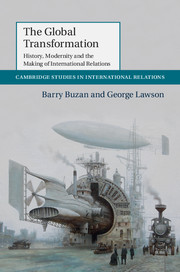Book contents
- Frontmatter
- Dedication
- Contents
- List of Figures
- List of Tables
- Preface
- List of Abbreviations
- Introduction
- Part I The Global Transformation and IR
- Part II The Making of Modern International Relations
- 3 Shrinking the Planet
- 4 Ideologies of Progress
- 5 The Transformation of Political Units
- 6 Establishing a Core–Periphery International Order
- 7 Eroding the Core–Periphery International Order
- 8 The Transformation of Great Powers, Great Power Relations and War
- Part III Implications
- Bibliography
- Index
4 - Ideologies of Progress
Published online by Cambridge University Press: 05 February 2015
- Frontmatter
- Dedication
- Contents
- List of Figures
- List of Tables
- Preface
- List of Abbreviations
- Introduction
- Part I The Global Transformation and IR
- Part II The Making of Modern International Relations
- 3 Shrinking the Planet
- 4 Ideologies of Progress
- 5 The Transformation of Political Units
- 6 Establishing a Core–Periphery International Order
- 7 Eroding the Core–Periphery International Order
- 8 The Transformation of Great Powers, Great Power Relations and War
- Part III Implications
- Bibliography
- Index
Summary
Introduction
During the long nineteenth century, history became to be seen as directional, while social change began to be considered as normal rather than exceptional (Wallerstein, 2011a: 1). A European-wide movement, known as Enlightenment in Britain, Lumières in France, Aufklärung in Germany and Ilustración in Spain, sought to harness change through reason, experiment and the professionalization of scientific knowledge (Weiner, 2003a: 2–3; Israel, 2010: 5; also see Koselleck, 2000 [1959]). Statistical methods produced an ‘avalanche of numbers’ that were deployed in the hope of ‘taming chance’ and providing solutions to endemic social problems ranging from poverty to crime (Hacking, 1990: 5, 78; Porter, 1995). ‘Radical enlightenment’ figures, many of them associated with the Atlantic revolutionary movements of the late eighteenth and early nineteenth centuries, produced influential, widely circulated works on how society could be ‘improved’ (Drayton, 2000; Israel, 2012). Condorcet’s discipline of ‘social mathematics’ was renamed ‘Sociology’ by Auguste Comte, who argued that a ‘science of the social’ could uncover the ‘laws of society’ (Hacking, 1990: 39–40). Academic chairs in Sociology began to appear in France in the 1850s and in the United States during the 1860s. Other disciplines followed suit as the ‘social movement’ of social science sought to professionalize research in the cause of ‘betterment’ (Wallerstein, 2011a: 227). In 1856, the Association for the Promotion of Social Science was established in London; in 1865, an equivalent body was founded in the United States. Both bodies were explicitly aimed at improving public policy (Wallerstein, 2011a: 228). Major new universities such as Sciences Po (1871) and LSE (1895) were formed with overtly ‘progressive’ aims. The accumulation of data and the systematization of knowledge were intended to improve the human condition through concerted programmes of social engineering (Giddens, 1985: 181; Porter, 1995; Drayton, 2000; Weiner, 2003b; Israel, 2012; Osterhammel, 2014: 24–9).
- Type
- Chapter
- Information
- The Global TransformationHistory, Modernity and the Making of International Relations, pp. 97 - 126Publisher: Cambridge University PressPrint publication year: 2015

